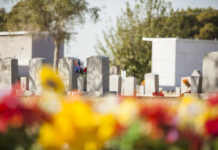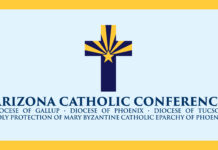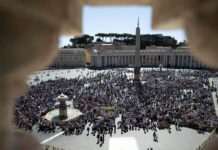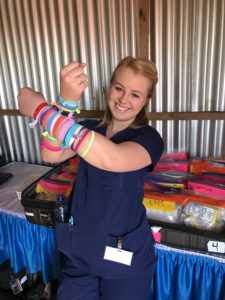
Barely into her second semester of college, one ASU freshman took a bit of a leap of faith. It was one that transplanted the Valley native to East Africa.
Cheyenne Murray, an alumna of St. Timothy School in Mesa and Seton Catholic Preparatory, wasn’t there for any form of college credit or assignment, but of her own volition. The one-time Christian Service Award recipient simply showed up to be of service across villages in Kenya with Covenant Medicine Outreach — despite admitting on her application she had no skills to offer.
Murray worked extra hours to raise money for the trip. She traveled to Kenya with three doctors, a dietician, a pharmacist, and nine nurses including one from Phoenix Children’s Hospital who grew up in the same Kenyan village where she served.
The Catholic Sun talked with Murray about her journey and her roots in serving others as a Catholic in the Diocese of Phoenix.
The Catholic Sun: What kind of service work were you involved in before the idea of a Christian Service Award came up?
Cheyenne Murray: My mom always did the linens for our church, so we were involved in that. [Murray has an older sister, now a senior at ASU, who also received a Christian Service Award]. We were both altar servers.
My Yaya [grandmother] was really big into bringing us to Paz de Cristo when we were of age [current guidelines suggest volunteers be 12 years old] and we started bringing our friends so that was really fun. We went once or twice a month.
I also would volunteer for the Vacation Bible School [at St. Timothy in Mesa]. I worked in the kitchen because I wanted to do the snacks.
Sun: Why did you seek a high school education that was Catholic?
CM: I chose Seton for my high school education because I knew it would be the best education I could get and a lot of my friends were going to be going with me. The emphasis was always on God and we were fortunate enough to get to practice our faith openly with no judgments, that was a big part for me. So I applied for the Christian Service Award after my Yaya found it [in time for my sister to apply and become a recipient three years earlier]. I had my own project that I did for it.
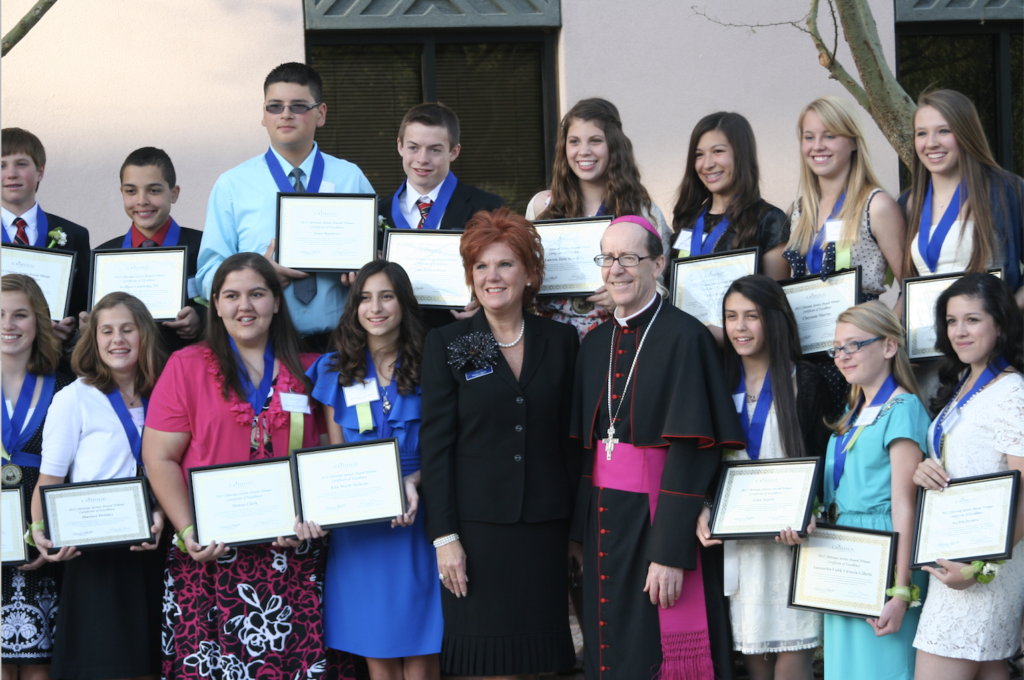
Sun: What project or projects helped you earn a Christian Service Award?
CM: I knew from day one service wasn’t supposed to be about me. I knew I had to serve my community not only for those people, but for my mom as well. Getting the award meant that going to Seton would be possible for me. I always went to Paz de Cristo year-round. When I was in junior high, my Papa was in the hospital for surgery and then he got moved to rehab. You know those little socks they give you? They’re weren’t as slip-proof as they would seem.
I decided to make those fuzzy slipper socks and paint them on the bottom [with puffy paints]. He needed to stay a bit longer so I raised the money and I made them for everyone on his floor. That was fun to me. It wasn’t hard work. I ended up taking them to other nursing homes around the Valley.
Sun: What service projects were you involved in during high school?
Editor’s Note: Seton requires students to perform 100 hours of community service each year. Freshmen and sophomores largely serve the campus community, juniors serve at their place of worship and seniors select projects within the greater community.
CM: One of my senior service projects was Feed My Starving Children. I also did Flower Girls through the Chandler Service Club. It’s a year-long look at etiquette, manners and self-growth. We did service projects with the girls in the club and we also did our own personal project.
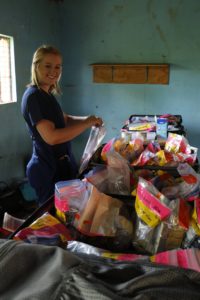
I sewed 53 blankets for Maggie’s Place. My mom was like, “If you’re going to give these blankets to the babies, you want them to really last.” So I asked family and friends for money to fund raise for the nicer material.
Sun: Now a college freshman, it sounds like you’re still making time for service work. Why is that important to you?
CM: I still occasionally volunteer at Feed My Starving Children and Paz de Cristo. I learned from a young age right after my sister won the award I wasn’t doing it for myself. There was a moment it clicked. You’re not supposed to do it for personal gain, you’re supposed to do it because someone else needs help — you are there for them.
Sun: How did you end up serving in Kenya?
CM: Some school friends went with their moms to India senior year [for service work]. I didn’t think anything of it at the time. By August or September, I felt I was really being called to this. I talked to a family friend about it and decided to apply. [On the application I wrote], I’m energetic. I have no medical skills, but I’m here to serve in any way I can!
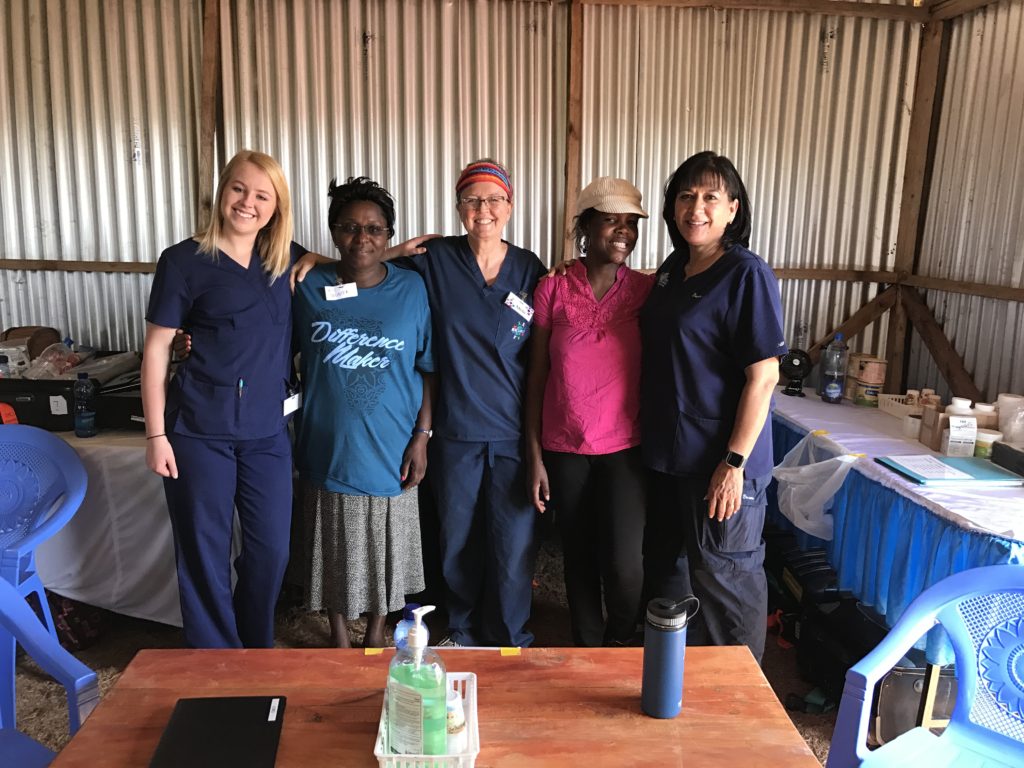
Sun: What was your role in Kenya?
CM: We stayed a week in Nairobi and traveled to rural villages around there. There were eight non-medical professionals. I worked alongside a pharmacist and another layperson. The patient would come in, they’d register, then they’d go get their height and weight, then they’d have an assessment with a doctor or nurse. Everybody gets vitamins and the kids get a toothbrush and then we’d dispense their medication. Then the translators would teach them how to take it and then they’d be on their way.
It was nice because at the [makeshift] pharmacy, you’d get to play and interact with the kids.
Everyone in that country is so nice and so welcoming. They shake your hand. They say, “Welcome to Kenya, thank you for coming.”
[The patients] sit outside all day and no one complains. They don’t have water or food, but nobody says a word and the first thing they do is smile at you. It was eye-opening
Some of the children are so sick, so malnourished, that we can’t help them medically, but all we can do is smile and hug them. We can tend to their spiritual and emotional needs by a simple smile or hug. It makes all the difference.
Sun: Is there a child, person or scene from your time in Kenya that still weighs on your heart?
CM: When I got there, I’m just heartbroken. I’m doing everything I can not to cry. These people have next to nothing, but they are far happier than most people I’ve met. It was the most rewarding thing I’ve ever done, but it was also the most difficult. It was one of those things you hear about [42 percent poverty], but you don’t realize how they actually live their life until you see it.
I now feel that there’s a different definition of ‘poverty’ here versus there. They can’t just walk to a food bank.
And there’s all these precious kids. There was a 4-year-old who weighed 16 pounds. She didn’t talk, but she smiled, she gave you hugs and she was really sweet. The whole situation is very trying on your heart. I was so happy all the time, but at the same time so sad. Even if I couldn’t give them everything that they needed, I could smile and that comforted them, and me, a little.
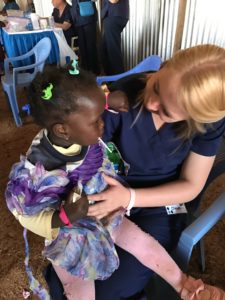
Sun: What sense did you get of the overall medical needs of the area?
CM: There’s this girl. She was 19. At first when you look at her [from a frontal view] she looks pregnant, but it’s actually a cyst. Once they go in and scrape that out, she’ll be fine. She can’t get the care. They don’t have the capacity to do that. There were healthy people too, but many unhealthier. Then there was this 93-year-old who was as sharp as a tack, he made me smile.
Sun: Did this experience cause you to reevaluate your major?
CM: I’m in the business school [at ASU] studying supply chain management. My childhood dream was to be a pharmacist. But as of right now, no. I think it’ll just do this as my commitment, to go on medical trips. I’m going [with Covenant Medicine Outreach] in June to Swaziland in Southern Africa.
Sun: What advice do you have for young children discerning a service project?
CM: Sometimes I feel like young kids can think of service as a chore, but that doesn’t mean it’s not enjoyable. Don’t just volunteer because you have to. Do it in a way that you like to, find a project that interests you and makes you a better person in the process.
Sun: What advice do you have for this year’s Christian Service Award recipients?
CM: I did Paz de Cristo and Feed My Starving Children a lot because I could. [Now in college], it doesn’t mean I can’t still enjoy going. Just make it a part of life as long as you find time, even if it’s twice a year. It’s really important to make time for other people besides yourself.



